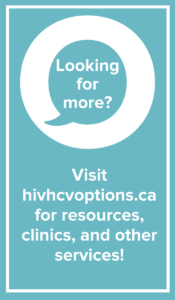HIV and HCV
Hi there!
How are you doing today? We hope today is treating you well and we also know you may be having a tough time right now, and may be really curious, scared, hurt, or worried about HIV and/or HCV (Hep C). But that’s exactly what we’re here for: to support you and help guide you towards the many resources available for folk and specifically for women* living with or at high risk of HIV/HCV. This section of our website is all about connecting folks with the resources and support they need.
If you are just looking to for specific info about the viruses you can visit Smart Sex Resource’s pages here for HIV and here for Hep C.
Read on to find out more about our project and resources, if you have any feedback or suggestions don’t hesitate to reach out to ketcoordinator@optbc.org
For over a decade, our team has been actively engaging with stakeholders and with community-based organizations that include connections with sex workers, cis and trans women living with HIV, migrant and refugee communities, adolescents and young adults, transgender, Two-Spirit, non-binary and gender diverse individuals, a well as incarcerated and precariously-housed individuals.
In 2019 Options for Sexual Health partnered with Pacific AIDS Network and the CIN to take on the development of a navigation tool for HIV and Hepatitis C services for women* across the Province of British Columbia (BC). Women make up 51% of the total Canadian population, and they account for over one quarter of the estimated HIV infections in Canada.
Recognizing the intersectionality of mental illness, problematic substance use, and homelessness with HIV and Hepatitis C we reached out to health care agencies across all five (5) regional health authorities and the First Nations Health Authority to identify services and the current gaps in services for women. Options conducted a survey which was administered to Service Providers & community organizations across British Columbia from April 23 until May 26, 2019 in hopes of gathering information. The survey was delivered through email to contacts identified through various committees and connections with the suggestion it be shared amongst their connections.
Through this survey, the most strongly identified gaps for those at risk or living with HIV/HCV include, but are not limited to:
- Lack of outreach and flexible hours
- Women’ voices being underrepresented
- Fewer resources and funding targeting women specifically for HIV
- Lack of women-centred spaces; very few women only resources exist across the province and aren’t specific HIV/HCV prevention and care and some services have lost funding
- Large amount of stigma
- Disparities between rural and urban services with extended services being largely unavailable to women outside of the greater Vancouver area
- Lack of training of general practitioners and consistency
- Need for Culturally appropriate care
As an ongoing priority, Options has delivered and developed professional education for its staff (delivered throughout the province), as well as partnered with organizations to disseminate and provide education and information regarding HIV/HCV in order to address gaps and needs identified in the original survey.
This is not a linear process; the work is on-going and our hope is to continue to develop a better understanding, as well as increase capacity, in terms of gender and sexual health equity among marginalized communities in British Columbia, Canada, and globally. One of our goals is to provide education and knowledge translation that works towards decreasing gaps and barriers, and improving culturally safe care.
Recognizing the intersectionality of mental illness, problematic substance use, and homelessness with HIV and Hepatitis C we reached out to health care agencies across all five (5) regional health authorities and the First Nations Health Authority to identify services and the current gaps in services for women. A survey was administered to Service Providers across British Columbia from April 23 until May 26, 2019 with the aim of gathering information. The survey was delivered through email to contacts identified through various committees and connections with the suggestion it be shared amongst their connections.
Link to our Website
If you need general assistance or would like to look for services you may like to access, this link may be helpful to you.
Please visit HIVHCVoptions.ca for a list and map of resources throughout the province.
Where to find more resources:
If you need general assistance or would like to look for services you may like to access, it might be helpful to visit our full HIV/HCCV website here: https://www.hivhcvoptions.ca/
Options Saturday Clinic for HIV/HCV
To meet the need for a large number of women* with HIV/HCV in and around Vancouver, we will operate a monthly Saturday Safe Space HIV/HCV Clinic. This is a women’s * only clinic, operated out of our Kootenay Loop office at 3550 E Hastings Street.
Peer Led Groups
To be announced!


